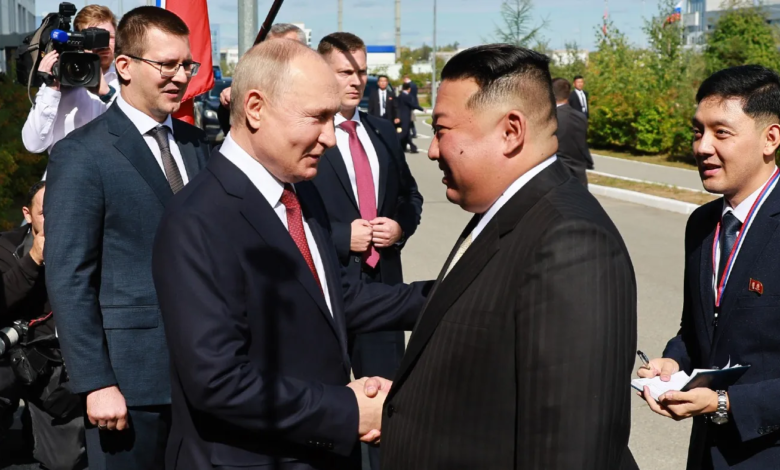North Korea-Russia Relations: A Complex Web of Diplomacy and Strategy

Understanding the intricate relationship between North Korea and Russia is essential for grasping the geopolitical dynamics of Northeast Asia. This comprehensive exploration delves into the historical context, current status, and future implications of North Korea-Russia relations, providing insights into their diplomatic, economic, and strategic interactions.
Historical Context of North Korea-Russia Relations
The roots of North Korea-Russia relations can be traced back to the Cold War era, when the Soviet Union played a pivotal role in the establishment and support of the Democratic People’s Republic of Korea (DPRK). Following the end of World War II, Soviet influence was instrumental in installing Kim Il-sung as the leader of North Korea, laying the foundation for the Kim dynasty that continues to rule the country. Throughout the Cold War, the Soviet Union provided substantial economic, military, and ideological support to North Korea, shaping its political landscape and foreign policy.
However, the collapse of the Soviet Union in 1991 marked a turning point. Russia, the Soviet Union’s successor state, initially distanced itself from North Korea, seeking to develop stronger ties with South Korea and the West. This shift left North Korea in a precarious position, losing a crucial ally and facing economic hardships without Soviet support.
Revival and Strategic Interests
The late 1990s and early 2000s saw a gradual revival of North Korea-Russia relations. Russia, under the leadership of Vladimir Putin, began to reassert its influence in global affairs, including in the Asia-Pacific region. North Korea, facing international isolation and economic sanctions due to its nuclear program, saw an opportunity to rekindle its relationship with Russia as a counterbalance to the influence of the United States and its allies.
The strategic interests of both countries have played a significant role in shaping their relationship. For North Korea, Russia represents a potential ally and economic partner that can provide much-needed support in the face of international sanctions and diplomatic isolation. For Russia, North Korea serves as a tool to exert influence in East Asia, challenge U.S. hegemony, and strengthen its position as a global power.
In recent years, Russia has expressed support for North Korea’s security concerns while also advocating for denuclearization and a peaceful resolution to the Korean Peninsula issue. This dual approach reflects Russia’s desire to maintain a balance between supporting North Korea and avoiding direct confrontation with the international community.
Economic Ties and Cooperation
Economic cooperation, though limited by international sanctions, remains a key aspect of North Korea-Russia relations. Russia has been involved in various infrastructure and development projects in North Korea, including railway and transportation initiatives. Additionally, North Korean laborers have been employed in Russia, providing a source of income for the North Korean regime, though this practice has faced scrutiny and restrictions due to international sanctions.
Energy cooperation is another area of mutual interest. Russia, with its vast energy resources, has the potential to supply North Korea with much-needed energy, although such transactions are complicated by sanctions and political considerations. The two countries have also explored collaboration in sectors such as mining, agriculture, and fisheries, but these efforts have been hampered by North Korea’s limited economic capabilities and the impact of sanctions.
Diplomatic Maneuvers and International Relations
Diplomatically, North Korea and Russia have engaged in a series of high-level exchanges and meetings. These interactions have served to reinforce their bilateral relationship and provide a platform for discussing regional security issues, economic cooperation, and strategies to counterbalance U.S. influence in the region. However, Russia’s role in North Korea-related negotiations, such as the Six-Party Talks, has been overshadowed by the more direct involvement of other regional powers like China, South Korea, and the United States.
Russia’s stance on the North Korean nuclear issue is complex. While supporting North Korea’s right to security, Russia has also called for denuclearization and adherence to international norms. This position reflects Russia’s broader foreign policy objectives of promoting stability in the region while also asserting its role as a key player in international diplomacy.
Challenges and Future Prospects
Looking ahead, the future of North Korea-Russia relations is fraught with uncertainties and challenges. The evolving global political landscape, including the dynamics of U.S.-China relations and the situation in the Korean Peninsula, will significantly influence the trajectory of their bilateral relationship. Additionally, international sanctions and North Korea’s continued pursuit of nuclear capabilities present ongoing challenges for deeper economic and strategic cooperation.
As Russia navigates its own geopolitical challenges and priorities, its relationship with North Korea will likely continue to be characterized by pragmatism and strategic considerations. Both countries will seek to leverage their relationship to advance their respective national interests while navigating the complexities of regional and global politics.
Conclusion
In conclusion, North Korea-Russia relations are shaped by a mix of historical ties, strategic interests, economic cooperation, and diplomatic maneuvers. While their partnership is influenced by external factors and internal challenges, it remains a significant element in the geopolitical landscape of Northeast Asia. Understanding this relationship is crucial for analyzing the regional power dynamics and anticipating future developments in this strategically important part of the world.



